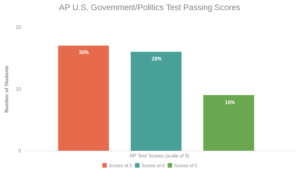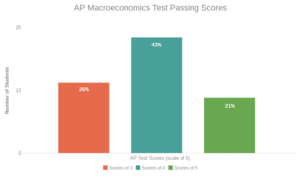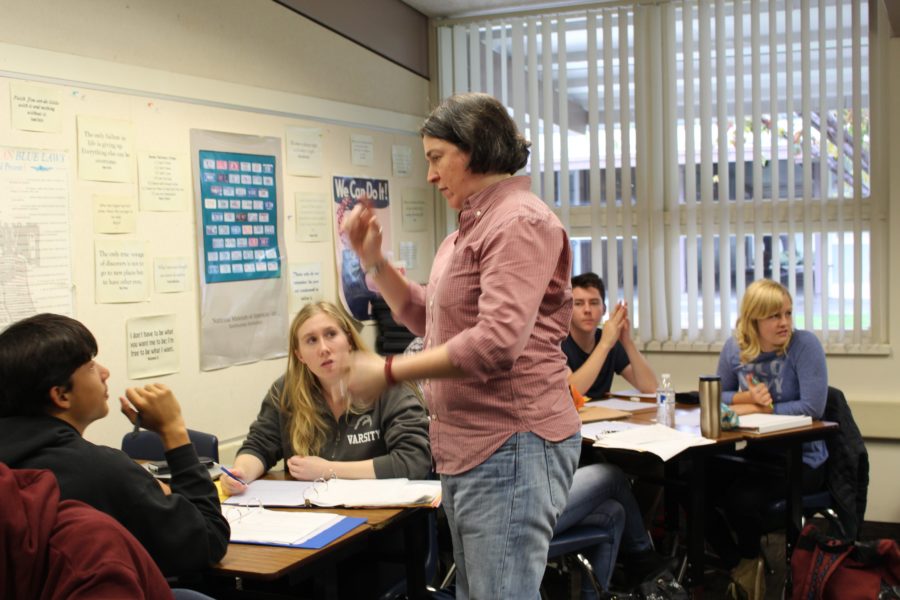The AP Macroeconomics and U.S. Government (APEG) class, a fast-paced social science course for seniors, launched at MVHS for the 2015-16 school year as the advanced placement counterpart to the Economics and Civics course.
The first semester of Macroeconomics is graph-heavy and covers basic macroeconomic concepts from measurements of the economy to fiscal and monetary policy in foreign exchange.
The second semester covers U.S. Government and Politics. This portion of the class provides an in-depth study of the structures of the American government system, policy outcomes, and how both reflect the U.S. Constitution, introducing students to historical and modern political jargon.
The class is primarily taught through interactive lectures and inquiry-based learning.
As a combination course, APEG uses two AP textbooks, one for each semester, and prepares students for two separate AP tests at the end of the year.
The school board decided to offer APEG at MVHS after students voiced interest in taking the course.
“Most of those students fell into top 5%,” said Felitia Hancock, one of the APEG teachers. “I think the school board was interested in honoring student choice if they wanted to take AP for Econ/Civics. [I think it was] also driven by the perception that the more APs you take, the more competitive you are for college admission.”
According to Hancock, the social sciences department was originally not in favor of offering APEG.
“When students originally come in [freshman year], [everyone] takes World Studies in heterogeneous groups,” Hancock said. “Then, students self-select, and the self-selection has traditionally seen a split that mirrors the racial/economic split. AP classes are dominated by students who are white or Asian and come from middle class families. When you get to the senior, year, what we thought was, you bring everybody back together again. [In APEG] when we are talking about power and responsibility of citizens, it felt to us that everyone should be in the room together. That’s why we did not want to have AP at the senior level.”
Student Response
One student currently taking APEG is Ron Miasnik.
“I’m really happy that there is a class combining economics and government; the topics are extremely interconnected, and the class format ensures we don’t see them as two separate entities,” Miasnik said.
Like Miasnik, who said he is interested in majoring in one of the two subjects, seniors seeking depth over breadth for either economics or government can take advantage of this AP class.
“I decided to take APEG because I hadn’t taken an AP social sciences before and I was interested…[I] wanted to be in a class where people were genuinely interested in learning economics,” said Allie Coyne, an APEG student.
Slightly over half of the students who completed the APEG course last year took the corresponding AP exams. The passing rate (score of three or higher on a scale of five) was 91% for the AP Macroeconomics exam, with an overall average score of 3.72. The passing rate for the AP U.S. Government and Politics exam was 74%, with an overall average score of 3.26.


The 2015-16 class earned an average 4.18 weighted GPA and 3.82 weighted GPA for the first and second semesters, respectively.
According to Kristin Cardenas, one of the APEG course teachers, “[students] did not do as well as we thought they would [on the AP U.S. Government and Politics Exam due to] some of the nuances of AP test questions and what the college board is looking for.”
To better prepare students for the AP U.S. Government and Politics Exam this year, Cardenas and Hancock are giving students more opportunities to practice with College Board questions.
Challenges in the Classroom
With Macroeconomics, Cardenas explained how students can have a hard time learning a subject in which they have “little prior knowledge.”
“We adopt a different way of learning. Economics doesn’t fit into the traditional scope of humanities or hard sciences—Macroeconomics sort of combines the two but doesn’t satisfy either,” Miasnik said.
In addition, some students were surprised to find that, due to the nuances and complexities of the economy, many formulas and principal concepts cannot be easily applied to real-world scenarios.
“Sometimes, concepts are super complicated that lead to a lot of what-if questions, and in order to do well on the AP exam, you have to not question that stuff, even if it may seem contradictory,” senior Julia Rogers said. “[You have to] learn to find a balance between asking questions and accepting theory as fact.”
Miasnik said he expected more conversation about real-life scenarios and implications to what the class is learning, such as the president election, economic tax policies, and government spending.
“I thought we’d be discussing the real-life much more than we actually are. The concepts we are learning do translate to the real world, but we don’t understand concepts fully to have those conversations,” Miasnik said.
In order to expose students to Macroeconomics earlier on, the APEG teachers plan to incorporate Macroeconomic fundamentals into the new Financial Literacy class which will be taught next year by Marcia Wold, one of the teachers in the math department.
“In terms of government, we mistakenly assumed a higher degree of familiarity with the concepts than students had,” Hancock said. “They have a general sense, but not [of] the nuances and complexities of political science.”
The teachers have aimed to make the class accessible and accommodating to all students.
“Our biggest challenge was [constructing] these two courses so that we fulfill the requirements of College Board, but we create a heterogeneous environment with a class culture [in which] all students could walk in and take the class without feeling alienated,” Hancock said. “[The second challenge was] honoring different learning styles in the classroom and still preparing students for AP test.”
Homework Policy
As part of an effort to address these challenges, students in APEG are assigned textbook reading homework for three to four nights a week and are provided optional guided reading questions; but both teachers intentionally do not check or grade the reading homework as part of the class policy to reduce student workload.
Instead, the textbook and guiding questions are offered to students as a resource, but the students can decide how they want to use those tools, which includes when or if they do the reading, and what measures they should take to succeed in the class. The instructors emphasize mastery of the concepts, but according to Hancock, “how you arrive there is up to you.” Student mastery of the concepts is worth 90% of the class grade.
“Homework [is] intended to be an extension, a reinforcement of the learning. We have no interest in giving homework just for homework’s sake. We also want to honor the ebbs and flows of seniors. We have designed the curriculum so that more is being done in class and less homework is being assigned,” Hancock said.
In comparison to the non-AP Economics and Civics class, Hancock said that APEG gives about 25% more homework.
“The flexibility of when you have to understand that content makes it a more palatable course,” Rogers said in reference to the homework policy. “It’s a great first or second AP to take for that reason.”
Students in the class use a variety of strategies, whether it is doing the reading nightly, on the weekend, or doing it all at once some time before the test.
According to Cardenas, “[it] can cause a problem with motivation to do [the homework].”
“A side effect of the policy is [that] students can take advantage of it and not utilize it at all, [which] might turn into bad test scores and not learning the material,” Miasnik said.
When asked if he saw students not doing the homework, Miasnik said yes.
“Because of the leniency, I definitely can see that students are a little bit less invested in the class,” Rogers said.
Coyne, Miasnik, and Rogers all said that the homework policy was overall positive for them.
“Ms. Hancock and I have designed the course with student wellness in mind. We keep our homework reading schedule very reasonable and try not to have problem sets or assessments around the more stressful time of year for seniors. We truly believe any senior could take, and succeed in, APEG,” Cardenas said in an email.
































